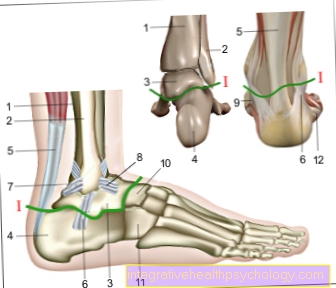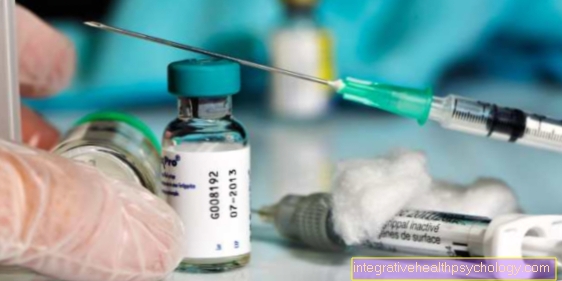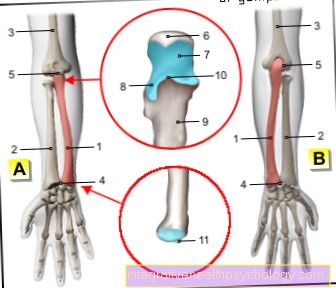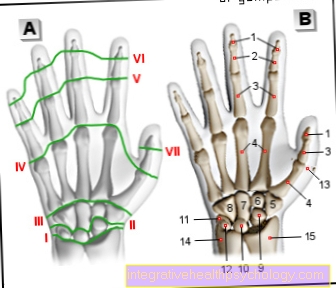Acarbose
Trade name
Among other things, Glucobay®
introduction
Acarbose is used as a drug to treat non-insulin-dependent diabetes mellitus (primarily type II diabetes).
It works by inhibiting certain enzymes in the gastrointestinal tract (alpha-glucosidases) that are responsible for breaking down sugars (carbohydrates). This leads to a delay in glucose uptake (resorption). The delayed splitting and absorption of glucose prevents a sharp rise in blood sugar after meals (postprandial blood sugar spikes).

Disclaimer / Exclusion of Liability
Please note that we do not claim to be complete or correct in any of our texts. The information may be out of date due to current developments.
All details are only excerpts, therefore important information cannot be given.
We expressly point out that all medicines may never be discontinued, applied or changed independently and without consultation with your treating doctor.
effect
The active ingredient acarbose is a substance that is very similar in structure to a multiple sugar. It is used in the treatment of diabetes mellitus and is one of the oral antidiabetic drugs. These are drugs that, unlike insulin, come in the form of Tablets administered.
The acarbose is particular in the early stage of type 2 diabetes mellitus used in addition to lifestyle-modifying measures such as diet. It is also possible to supplement with other anti-diabetic drugs such as metformin, sulfonylureas or even insulin.
Acarbose belongs to the group of so-called alpha-glucosidase inhibitors. It inhibits the enzyme alpha-glucosidase, which splits carbohydrates. This will make the Delayed breakdown of carbohydrates in the small intestine. Less glucose and other simple sugars (monosaccharides) are absorbed into the blood. So above all Blood sugar spikesthat would otherwise occur immediately after eating, prevented. Such blood sugar peaks are known as postprandial blood sugar spikes. The rise in blood sugar is slower after eating. The effectiveness however, the acarbose is strong depends on the time of intake. If taken too late, the effectiveness is significantly reduced, so acarbose at the beginning of the main meal should be taken.
Acarbose does not prevent the absorption of glucose from food. Milk sugar also remains unaffected by the effect, as it is broken down by other enzymes. In the case of strong blood sugar increases or difficult-to-control type 2 diabetes, acarbose is therefore not sufficiently potent to control the diabetes. Because acarbose often increases complaints how Flatulence or diarrhea leads and therefore not particularly well tolerated is, it is a rather rarely used drug. Acarbose is not suitable for treating type 1 diabetes mellitus. There are still some contraindications and side effects to be considered when using acarbose.
Acarbose dura®
Acarbose dura® is a medicinal product sold by the company Mylan Dura GmbH. It is prescription only and can therefore only be purchased in a pharmacy on presentation of a doctor's prescription in the form of a prescription. There are tablets with a dosage of 50 mg or 100 mg. Acarbose dura® is that Trade name for the active ingredient acarbose and only designates the publisher of the drug. It's the same active ingredient found in other companies' acarbose supplements.
The medicine contains acarbose, which is one of the so-called alpha-glucosidase inhibitors. It delays the absorption of glucose and other simple sugars in the intestine. This slows down the increase in blood sugar after eating and prevents blood sugar spikes. Acarbose dura® finds Use in non-insulin-dependent diabetes mellitus and type 2 diabetes mellitus. Acarbose dura® is not suitable for the therapy of type 1 diabetes. It is mostly used when the diabetes cannot be stopped by changing diet and exercising alone. It is suitable both as monotherapy and in combination with other blood sugar lowering drugs such as metformin, insulin, or sulfonylureas.
At a severe functional impairment of the kidneys or liver, chronic bowel disease, one Allergy to the components from Acarbose dura® as well as in the pregnancy and breast feeding period allowed the drug not taken become. There are also side effects and interactions that must be observed and can be found in the package insert. The usual dosage unless otherwise prescribed by the doctor, 3 times 50 mg (equivalent to 3 x 1 tablet) daily. A creeping dosage has proven itself to reduce side effects in many patients, so that initially start with a lower dosage, which is then slowly increased over the course.
Side effects
The most common Side effects when taking Acarbose are:
- Flatulence (Flatulence)
- Bloated stomach (Meteorism)
- diarrhea
- stomach pain
- nausea
- Vomit
- Hypersensitivity reactions of the skin (Erythema, Exanthema, Urticaria)
- Constipation (Constipation)
In rare cases it can become a Intestinal obstruction (Ileus) come. Further rare side effects are a temporary increase in Liver values (Transaminases) in blood, Jaundice (Jaundice), Inflammation of the liver (hepatitis), Changes in blood count in the sense of a reduction in blood platelets (Thrombocytopenia) and Water retention (Edema) in the legs.
Hypoglycemia
Hypoglycaemia, so-called Hypoglycemia, can occur in the treatment of diabetes mellitus, as drugs are used to prevent high blood sugar. Compared to other drugs, the Acarbose but only one very little to almost nonexistent risk for the occurrence of such hypoglycaemia.
Interactions
Some Medication can they effect from Weaken acarbose.
These include other things Steroids (e.g. cortisone), the "pill"(Oral contraceptives), Medication to treat a epilepsy (Anti-epileptics, e.g. Phenytoin), certain drugs used to treat high blood pressure or Heart disease (Calcium channel blockers), Water tablets (Diuretics), Thyroid hormones (e.g. L-thyroxine), Hormones (e.g. estrogen), certain Tuberculosis drugs (Isoniazid) and Cholesterol lowerers (e.g. cholestyramine).
Acarbose can the admission from Digoxin (Heart drug) influenceso that its dose may need to be adjusted. A Combination treatment with other drugs used to treat diabetes mellitus (antidiabetic drugs, e.g. Sulfonylureas, Metformin, insulin) got to careful be done as the danger of one too strong lowering of Blood sugar (Hypoglycaemia).
dose
Acarbose is available as a tablet 50 or 100 mg Active ingredient available. The usual Initial dosage amounts to 50 mg 3 times a day (150 mg daily dose). In order to reduce the typical gastrointestinal complaints, a creeping dosage to begin with, try 50 mg only 1-2 times per day. The dose can be increased up to 300 mg per day.
Application of acarbose
Acarbose applies to treatment of non-insulin-dependent diabetes. It can be with others Antidiabetic drugs be combined. So is one Combination treatment of acarbose with Sulfonylureas, Metformin or insulin permitted.
Contraindication
Acarbose allowed at strong limited function from liver and Kidneys not be taken. Also as Contraindication be valid chronic intestinal diseases which are associated with a clear disruption of digestion and absorption (absorption) of food components.
Also diseases that can worsen due to increased gas formation in the intestine (e.g. Afford- or Diaphragmatic hernias, Roemheld Syndrome, Intestinal ulcers, Intestinal constrictions) are a contraindication to taking acarbose. Acarbose should still not be used Children under 18 years as well as during pregnancy and Lactation.
Renal failure
Acarbose is allowed in a severe renal impairment - i.e. with pronounced renal insufficiency not taken become. If you have such impairment of kidney function, acarbose should not be prescribed. As a parameter for Assessment of renal failure is usually the GFR (glomerular filtration rate) used. A value below 25 ml / min is considered to be extremely critical and is a contraindication. When diabetes mellitus is set, however, very strict attention is paid to whether the function of the kidney is intact, as diabetes itself can also limit this.
On a private prescription, a pack of 105 acarbose tablets costs á 50 mg 34 euros, a dose of 100 mg 40 euros. When prescribing a prescription at the POS, only the usual prescription fee is charged.

.jpg)





















.jpg)





